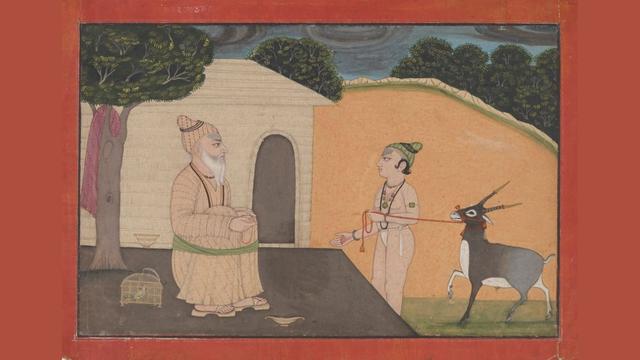“Guru” has become a derogatory word in a world that does not understand what a spiritual master is, as the Tai Ji Men case demonstrates.
by Massimo Introvigne*
*Conclusions of the hybrid seminar “Persecuting Spiritual Masters: The Tai Ji Men Case,” co-organized by CESNUR and Human Rights Without Frontiers in Walnut, California, on October 8, 2022, after the World Teacher’s Day

For reasons I and other scholars have discussed elsewhere, France has a particularly aggressive and government-sponsored system to fight against “cults,” called in French “sectes.” One of its most bizarre features is the use of the word “guru” as if it was a synonym of a criminal religious leader brainwashing and exploiting his or her followers for money, sex, and power. This use is now common in French-language media but is, if you would pardon my French, idiotic.
Not only is “guru” used outside the original context of spiritual masters in the tradition of the Indian religions, but the meaning of the word is totally misunderstood. “Guru” is a word used in the Indian tradition to indicate the best of all human beings. It is an ancient Sanskrit term with a variety of etymologies, which are complementary rather than alternative. A “guru” is first of all a “dispeller of ignorance,” as “gu” means “ignorance” and “ru” means “one who dispels.” A guru is one who has received a special call from the divine and calls others to enlightenment, from the Sanskrit root “giri,” “one who calls.” “Guru” also means one who “has weight,” figuratively but also physically: hence the representations of the Buddha as a fat man and the popular Indian legend that a guru on a scale has a weight much higher than an ordinary man or woman with similar features.

In his recent book “Global Tantra,” Julian Strube tells the extraordinary story how the early leaders of the Theosophical Society, who originally shared the prejudices against Tantrism of some rationalist Hindu reformers, were taught by their Bengali members that it is impossible to understand the Tantra from books. You need a living guru, and the most authoritative of them would firmly refuse to put their secret Tantric teachings in writing.
That to be enlightened you need a guru is already mentioned in the most ancient among the Hindu sacred texts, the Vedas, but it is in the later Vedas, the Upanishads, that the role of the guru becomes central, and this teaching is present in all the different Hindu schools. We are taught that even the gods need a guru. The ancient “Vishnu Smriti” claims that we have three parents: father, mother, and guru. “By honoring the father, we gain the earthly world; by honoring the mother, we gain the world of the gods; by paying strict obedience to the guru, we gain the world of ultimate reality.” “Strict obedience” in the early Hindu texts meant that we should serve the guru by providing him with money, personal services, and firewood for several years before he (or she) starts teaching us.
In the “Brhan-Naradiya Purana,” we read that once we have submitted to a guru, it does not even make sense to challenge one of his or her teachings as not true, since “there is no truth higher than the guru.” The great 17th-century Hindu philosopher Samarth Ramdas wrote in his masterpiece “Dasbodha” that “he who regards God as superior to the guru is a fool […]. Before the greatness of the guru the greatness of God is as nothing.”

Surely these are peculiarities of the Hindu tradition non-Hindus may regard as exaggerations, but there are parallels elsewhere. In the “Spiritual Exercises” by Ignatius of Loyola, the founder of the Catholic religious order of the Jesuits (of which the present Pope is a member), we read the famous sentence that “the white that I see I would believe to be black” if so taught by the Catholic Church’s hierarchy.
Obviously the obedience to the spiritual master includes the risk of abuse. However, charges of abuse should be evaluated within the context of the religious tradition. Gurus who kill or rape their followers may not hide under pretexts of religious freedom. On the other hand, “being a guru” or establishing with the disciples a special relationship of trust and obedience is not illegal. It should not be evaluated through individualist and rationalist standards by media, or even by secular courts of law who do not understand the century-old religious principle of surrendering a great part of the disciple’s liberty to a spiritual master.
Indeed, as we heard in this and previous webinars, freedom of religion or belief is at risk when spiritual teachers are regarded with suspect and malevolence simply because they are teachers, and when politicians and bureaucrats try to break the master-disciple relationship simply because they do not understand it. Or perhaps because the only aspect of it they understand is that it creates a way of living and thinking different from the one they want to impose to everybody.

A textbook example of this malevolence is the attempt by Prosecutor Hou Kuan-Jen and others, starting in 1996, to break the relationship between Shifu (Grand Master) and dizi (disciples) of Tai Ji Men. It is also an example of how these attempts, while causing a considerable amount of unnecessary suffering, in most cases fail. Authentic spiritual masters can be put in jail, harassed, persecuted, but their disciples would not leave them. If anything, the persecution made the bond between Shifu and dizi of Tai Ji Men stronger. However, this is not a reason to tolerate ill-founded campaigns of harassment, including through taxes. Spiritual teachers should be honored, understood, and protected from persecution. This is where World Teachers Day meets freedom of religion or belief.
Source: Bitter Winter

